Elderberries are one of my most used go-to herbal remedies for cooler months. They’re both immune-boosting and delicious in different recipes. I make DIY elderberry marshmallows, tea, and even kombucha. This easy elderberry syrup recipe is a great way to get all of their benefits!
The dried berries of the Sambucus nigra plant are naturally high in antioxidants that help with colds and flu. You can use them in a variety of remedies, and my favorite is this simple elderberry syrup.
Elderberry: A Natural Remedy for Colds and Flu?
There’s certainly a time and a place for conventional medicine and doctor visits. Unfortunately, there isn’t much conventional medicine can do for the common cold or even a mild case of the flu.
If you or your child has ever had a rough case of the common cold or the flu, you know how miserable it can be. Especially for moms. It’s awful to see your children feeling so bad and not be able to fix it. Thankfully, nature provides us with remedies that can help. And help shorten the duration if we do get them.
Research shows black elderberries (Sambucus nigra) can help us avoid these illnesses. They can even help speed recovery time for those who already have them. I’ve also found elderberries offer some relief from discomfort during minor illnesses.
Benefits of Elderberry
Elderberries naturally have vitamins A, B, and C and stimulate the immune system. Israeli researchers found elderberries pack a punch when it comes to colds and flu. Their complex sugars are clinically shown to help support the immune system. It can cut recovery time in half or better!
Dr. Madeleine Mumcuoglu, of Hadassah-Hebrew University in Israel found that elderberry disarms the enzyme viruses use to penetrate healthy cells in the lining of the nose and throat. Taken before infection, it prevents infection. Taken after infection, it prevents spread of the virus through the respiratory tract. In a clinical trial, 20% of study subjects reported significant improvement within 24 hours, 70% by 48 hours, and 90% claimed complete cure in three days. In contrast, subjects receiving the placebo required 6 days to recover.
Elderberry Syrup Recipe With Honey
Elderberry syrup provides the concentrated immune-supporting benefits of black elderberries. Plus it tastes great! My recipe uses homemade elderberry concentrate with synergistic herbs like cinnamon and ginger. Plus raw honey for an extra immune boost. If you can’t/don’t use honey, see the substitution suggestions below the recipe.
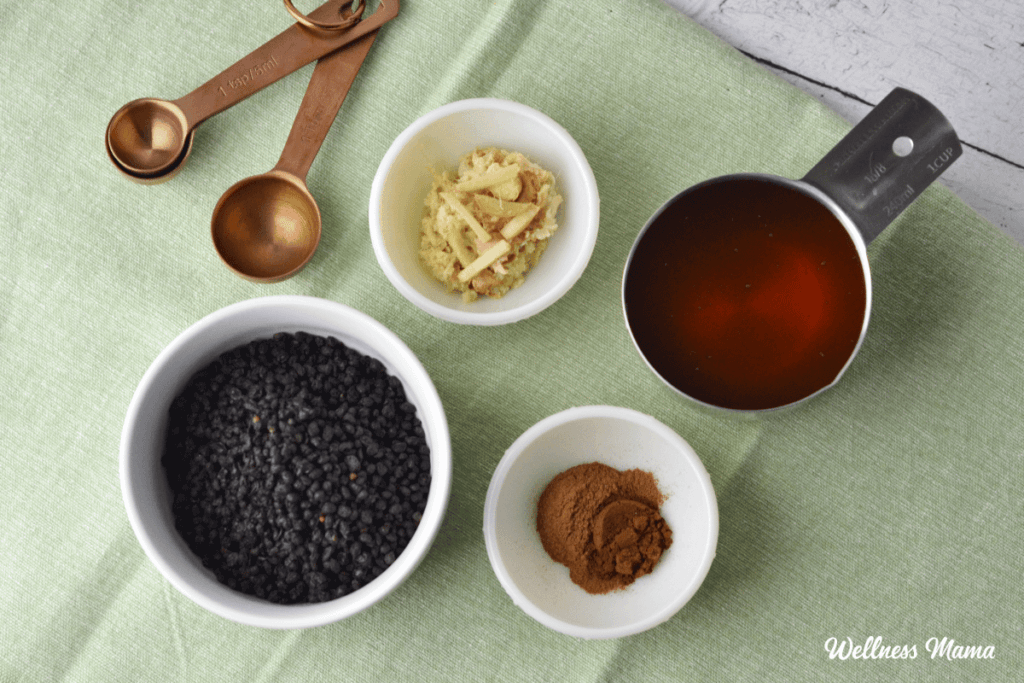
- Start by assembling your ingredients. I use grated ginger, ground cinnamon, ground cloves, elderberries, and raw honey. Cinnamon sticks and whole cloves also work.
- Pour the water into a medium saucepan and add the elderberries, ginger, cinnamon, and cloves. Bring to a boil and then uncover and reduce to a simmer for about 30 minutes or until the liquid has reduced by half.
- Remove from heat and let cool until it’s lukewarm. Mash the berries carefully using a spoon or other flat utensil
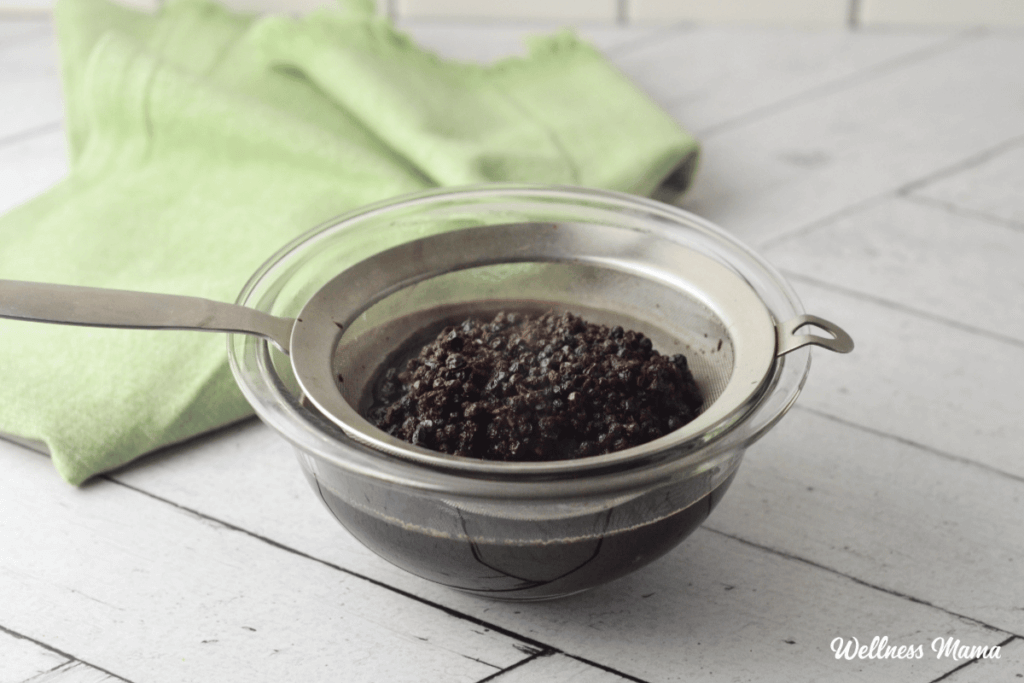
- Pour through a strainer or cheesecloth into a glass jar or bowl. Discard the elderberries.
- When the liquid is no longer hot, add the cup of honey and stir well.
- When the honey is well mixed into the elderberry mixture, pour the syrup into a mason jar or glass bottle of some kind.
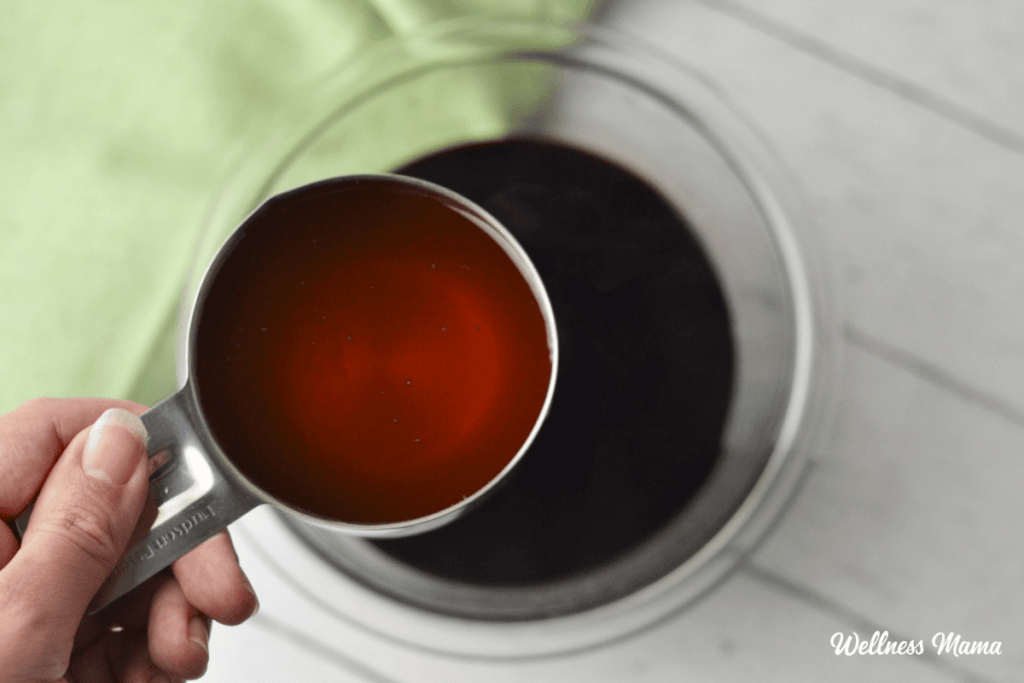
Why Make Your Own Elderberry Syrup?
For one, you’ll save a lot of money!
You can buy natural elderberry syrup at health food stores or online. But usually for around $15 or more for 4-8 ounces. This recipe makes 16 ounces for way less and kids love the taste! You can also fully customize this recipe based on your needs and flavor preferences.
Don’t have any dried elderberries on hand? There are some great pre-made elderberry gummies and elderberry syrup that work just as well. But these supplements do cost more. Also, if you have fresh berries or frozen elderberries on hand, just use double the amount in the recipe.
Making your own elderberry syrup is easy with this recipe!
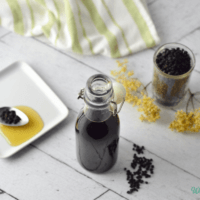
Elderberry Syrup Recipe
Servings
Equipment
Ingredients
- 3½ cups water
- ⅔ cup dried elderberries (or 1 1/3 cups fresh or frozen)
- 2 TBSP ginger (grated)
- 1 tsp cinnamon
- ½ tsp ground cloves
- 1 cup raw honey
Instructions
- Pour the water into a medium saucepan and add the elderberries, ginger, cinnamon, and cloves.
- Bring to a boil and then uncover and reduce to a simmer for about 30 minutes or until the liquid has reduced by half.
- Remove from heat and let cool until it's lukewarm.
- Mash the berries carefully using a spoon or other flat utensil.
- Pour through a strainer or cheesecloth into a glass jar or bowl. Discard the elderberries.
- When the liquid is no longer hot, add the cup of honey and stir well.
- When the honey is well mixed into the elderberry mixture, pour the syrup into a mason jar or glass bottle of some kind.
- Ta-da! You just made homemade elderberry syrup! Store in the fridge and take daily for its immune boosting properties.
Nutrition
Notes
More of a Visual Person?
Here is my one-minute tutorial video for how to make elderberry syrup:
What Does Elderberry Syrup Look/Taste Like?
I’ve found that elderberry on its own tastes a little sour, kind of like grape juice. The honey turns it into a sweet and tasty syrup though. Unlike some store bought versions, or syrups made with sugar, this one is thinner. So don’t be surprised if your elderberry syrup seems more liquid like!
What’s the Difference Between Elderberry Syrup and Elderberry Juice?
This recipe makes a strong elderberry tea or concentrate that’s mixed with honey. Traditionally, herbal syrups are usually made with herbal tea and sugar for a thick, syrup. This version is thinner because it’s made with raw honey. Elderberry juice however is simply the juice squeezed from fresh elderberries.
How Long Does Homemade Elderberry Syrup Last?
The short answer is it really depends. I’ve found that placing the finished syrup in a mason canning jar while it’s warm creates an air-tight seal. This allows it to last much longer in the fridge, up to several months. As a general rule, it lasts about two weeks in the fridge. I typically freeze whatever I won’t use during that time. You can also freeze some in an ice-cube tray and defrost small amounts when needed.
Fresh Elderberry Syrup Recipe
You can harvest fresh elderberry and even grow your own elderberry bush. But it’s important to make sure you’re growing the correct plant. I also recommend working with a local herbalist to find/harvest fresh elderberries. Make sure to only harvest the berries. The stems and leaves are toxic.
Where is the Best Place to Order Elderberries?
We don’t have a local source, so I’ve always ordered in bulk from an online source. (Order early because they always run out come Fall!) You can get wildcrafted or organic elderberries here. If you would like to purchase a full kit, our friend at Kombucha Kamp has a great one for sale.
What is Elderberry Syrup Used For?
Our family uses it as a preventative remedy by taking 1/2 to 1 teaspoon a day during peak cold and flu season. If we get hit with a minor illness, we double or triple that dose until we feel better. Elderberry is commonly used for immune support and can be used year round as needed for its health benefits.
The unique and complex flavor of elderberries also makes this syrup a great ingredient in certain recipes. I’ve made an elderberry panna cotta by substituting elderberry syrup for the sweetener. It would also make a yummy topping for homemade ice cream or pancakes.
How Much Elderberry Syrup Should You Take Daily?
This is really a question for an herbalist or natural healthcare provider. Personally, I take 1 teaspoon a day as an adult and give half of this to my kids. During illness, I double or triple this amount.
Elderberry Syrup Ingredients and Substitutes
I prefer to use raw, local honey when possible, but raw honey from the store will also work. I also use fresh ginger here, but you could use powdered if that’s what you have (just reduce the amount to 1/2 tsp). And cinnamon sticks and whole cloves could be substituted for the powdered herbs.
If you want to use powdered elderberries use about 1/2 cup instead of 2/3 cup in the recipe. I’ve used them before when whole elderberries weren’t available.
Is There a Substitute For Honey in Elderberry Syrup?
Some people prefer not to use a sweetener. Honey also isn’t recommended for babies under 1. Some easy substitutes are:
- Use maple syrup or nutrient-rich molasses in place of the honey.
- Omit the sweetener altogether (this will make elderberry juice which needs to be consumed much more quickly).
- Make an elderberry tincture for adults. Mix the concentrated elderberry syrup with equal parts food-grade alcohol like vodka or brandy instead of sweetener. This obviously wouldn’t be for kids but is a sweetener-free elderberry extract option for adults.
Can I Reuse the Elderberries?
I don’t recommend reusing them. Ideally, the boiling/mashing process removes much of the nutrients from the berries. Also, there’s some evidence that consuming large amounts of whole berries can be problematic.
I have more elderberry recipes on the blog, including elderberry kombucha and elderberry tea. You can even use the syrup to make elderberry gummies!
This article was medically reviewed by Dr. Scott Soerries, MD, Family Physician, and Medical Director of SteadyMD. As always, this is not personal medical advice and we recommend that you talk with your doctor.
Ever taken elderberry? Will you try this recipe? What natural ways do you use to ward off illness?
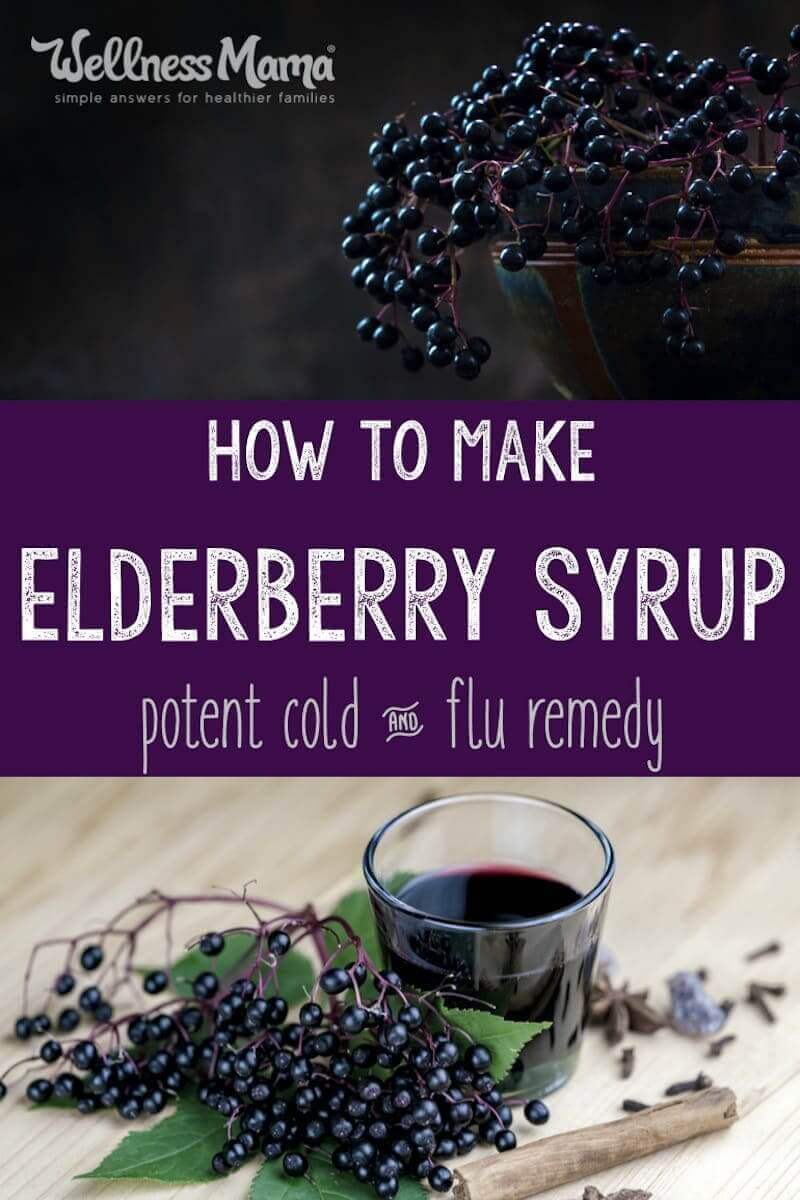




Leave a Reply